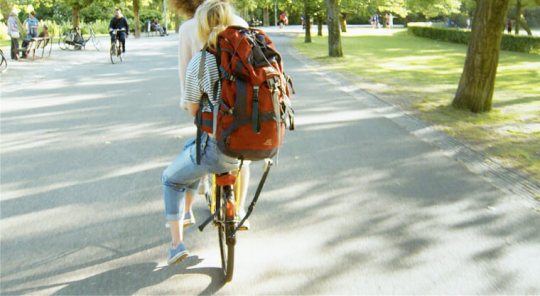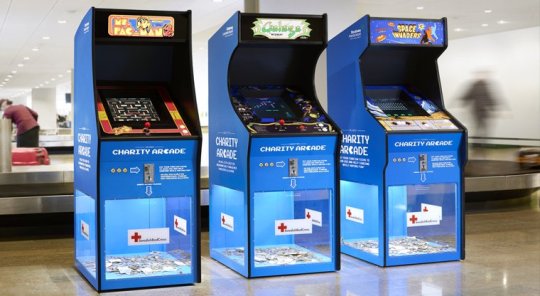
1 Fashion mini-bar in Belgian hotel rooms
For many, a trip is not complete without some kind of retail therapy. But it’s often hard to find the time, especially on business trips packed with meetings and events. That’s why clothing brand Pimkie set up a Mini Fashion Bar at the Banks Boutique Hotel in Antwerp, Belgium, so guests can try on and purchase clothes in their hotel room. Since then we have seen many establishemnts follow suit, collaborating with local retailers to give customers a multi-faceted experience, as well as cater to the forgetful travelers who may be in need of last minute raincoats or sunglasses. The Dylan Hotel in Amsterdam also now has a Room Shopping service, which lets guests browse products from the local 9 straatjes district in their room, with delivery under an hour.
2 Amsterdam scheme lets visitors hitchhike on the back of locals’ bicycles
We are seeing many city-wide schemes facilitating interaction between tourists and locals. Yellow Backie is an Amsterdam initiative which encourages visitors to adopt the Dutch custom and get a free ride on the luggage rack of locals’ bicycles — all they have to do is shout “Backie!” to hail a ride when they spot the designated bright yellow rack. In Brazil, a marketing campaign by Zeze Biscuits called Feeding New Friends assigned seating on public buses, which indicates that the passenger is open to talk and make friends. Finally, Backstreet Academy aims to democratize developing nations’ tourism revenue by enabling locals to offer one-of-a-kind tours or activities to visitors who want to experience the city’s true culture. Are their similar ways to connect tourists and locals?
3 Credit card automatically offsets consumer’s carbon footprint
The huge expense that comes with traveling can leave jet-setters guilt-ridden. But there are ways to let users earn social responsibility points, like Sustain:Green’s eco-friendly credit card — it automatically offsets the CO2 emissions associated with users’ spending by investing in rainforest preservation and reforestation, as an alternative to earning air miles or rewards. Similarly, travel agency Travelty enables customers to auto-donate one percent of their holiday expenses to charity. How else can travel be made greener and more sustainable?
4 ‘Takeaway’ hotel will be delivered to guests’ chosen location
As portable home technology advances, those wishing to travel to remote areas are offered more and more possibilities. Scandic To Go is one such platform — it delivers pop-up hotel rooms to any location picked by the customer. Guests can enjoy free wifi, the usual room service, and even breakfast. This also makes way for further holiday personalization, an area increasingly important to those who want to make the most of their precious holidays. The Ecocapsule, a portable home powered by wind and solar, could be another option.
5 Startup cancels and rebooks hotel rooms to get users the best deal
Of course, with increased choice comes the pain of trawling through different agencies and websites for the best prices and deals. To fix this, a startup called DreamCheaper wants to help customers make the best of hotels’ fluctuating room prices. The automated process does this by canceling and rebooking rooms, right up until the day before check-in, and claims to be able to save customers an average of EUR 65 or 15 percent of their bill.
6 Airport arcade games give leftover travel currency to charity
A place of constant innovation in travel and tourism is, unsurprisingly, the airport. Travelers departing one currency zone for another are often left with loose change not worthy of exchanging into foreign funds. But instead of a generic donation box, Charity Arcade gamifies the experience by installing classic arcade games — Pac-Man, Space Invaders and Galaga — in the terminals of Swedish airports, which then donates the coins to Red Cross.
7 Service offers luggage-free travel to frequent fliers
Another trend we’re seeing is the option for frequent travelers to go luggage free. Singapore-based Packnada enables passengers to travel with only a passport — its wardrobe storage service delivers everything else to their hotel each time they land. Customers can leave up to 20 items at their hotel, and the team will pick them up, launder them, and store the clothes for future visits. At the same time, the Grand Hyatt in Melbourne has launched a scheme to enable visitors to leave any number of belongings on site, and request they be dry cleaned and ready for their next stay. It probably doesn’t get more baller than that.
8 Hamburg walls are coated with “splashback” paint to punish public peeing
Allowing tourists to get tips from locals is great, but sometimes residents want to communicate with visitors for other reasons. Especially if they’re drunk and urinating in their beloved neighborhood. An ingenious solution by St Pauli’s Community of Interest wishing to combat the issue — as their area is known as a party district — punishes public pee-ers by installing the walls with “splash back” paint, so the urination, well, splashes back.
9 In Vienna, tourists share boutique hotel with young refugees

Perhaps another way travelers can enjoy a more charitable holiday is to stay at social enterprise establishments. Magdas Hotel in Vienna provides employment and housing for young refugees alongside open minded guests. Launched by non-profit Caritas, it alleviates the city’s refugee situation while raising awareness and presenting asylum seekers as contributing members of the society, rather than faceless statistics. Similarly, the Ritz-Carlton Hotel in Washington has an initiative that get guests involved in the community projects during their stay, in return for a host of complimentary perks.
Read more about Magdas Hotel »
10 AI restaurant guide makes friendly recommendations
Lastly, there is no such thing as a trip without culinary memories. Though sites like Yelp and TripAdvisor have revolutionized the industry with user reviews, they can be time consuming and tedious to trawl through. Russian artificial intelligence app IO hopes to help users find restaurants nearby by chatting to them with its natural language functionality and its ability to learn their eating preferences. Users can ask things such as ‘What’s good on the menu’, ‘What’s the atmosphere like?’, and ‘Can I take a date?’. Also, in Tokyo the Metropolitan Government has financed a culinary website that lets restaurants create printable menus in twelve languages. Owners simply upload their menu to the Menu Tokyo site to receive their translated copies. What are some other ways to make local eating more seamless?













